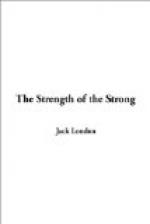But there was one scholar China failed to reckon on—Jacobus Laningdale. Not that he was a scholar, except in the widest sense. Primarily, Jacobus Laningdale was a scientist, and, up to that time, a very obscure scientist, a professor employed in the laboratories of the Health Office of New York City. Jacobus Laningdale’s head was very like any other head, but in that head was evolved an idea. Also, in that head was the wisdom to keep that idea secret. He did not write an article for the magazines. Instead, he asked for a vacation. On September 19, 1975, he arrived in Washington. It was evening, but he proceeded straight to the White House, for he had already arranged an audience with the President. He was closeted with President Moyer for three hours. What passed between them was not learned by the rest of the world until long after; in fact, at that time the world was not interested in Jacobus Laningdale. Next day the President called in his Cabinet. Jacobus Laningdale was present. The proceedings were kept secret. But that very afternoon Rufus Cowdery, Secretary of State, left Washington, and early the following morning sailed for England. The secret that he carried began to spread, but it spread only among the heads of Governments. Possibly half-a-dozen men in a nation were entrusted with the idea that had formed in Jacobus Laningdale’s head. Following the spread of the secret, sprang up great activity in all the dockyards, arsenals, and navy-yards. The people of France and Austria became suspicious, but so sincere were their Governments’ calls for confidence that they acquiesced in the unknown project that was afoot.
This was the time of the Great Truce. All countries pledged themselves solemnly not to go to war with any other country. The first definite action was the gradual mobilization of the armies of Russia, Germany, Austria, Italy, Greece, and Turkey. Then began the eastward movement. All railroads into Asia were glutted with troop trains. China was the objective, that was all that was known. A little later began the great sea movement. Expeditions of warships were launched from all countries. Fleet followed fleet, and all proceeded to the coast of China. The nations cleaned out their navy-yards. They sent their revenue cutters and dispatch boots and lighthouse tenders, and they sent their last antiquated cruisers and battleships. Not content with this, they impressed the merchant marine. The statistics show that 58,640 merchant steamers, equipped with searchlights and rapid-fire guns, were despatched by the various nations to China.




